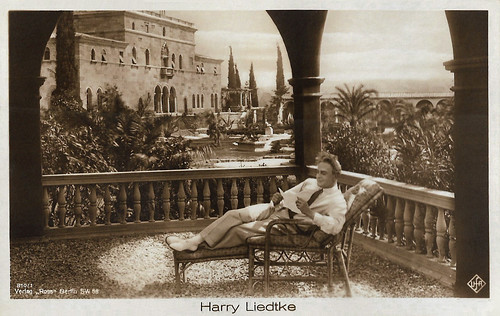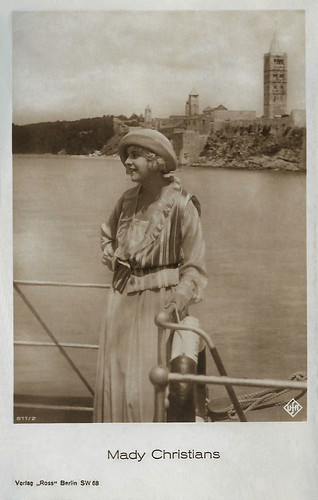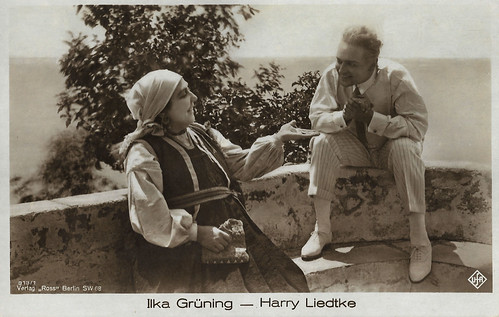
Yugoslavian postcard by Jos. Caklovic, Zagreb, no. 37. Photo: Balkan Film, Zagreb. Alfred Abel in Die Finanzen des Großherzogs/The Grand Duke's Finances (F. W. Murnau, 1924). Collection: Didier Hanson.

German postcard by Ross Verlag, Berlin, no. 809/1. Photo: Ufa. Harry Liedtke and Mady Christians in Die Finanzen des Großherzogs/The Grand Duke's Finances (F. W. Murnau, 1924).

German postcard by Ross Verlag, Berlin, no. 809/2. Photo: Ufa. Harry Liedtke and Mady Christians in Die Finanzen des Großherzogs/The Grand Duke's Finances (F. W. Murnau, 1924).
A series of frantic chases, plots, and counter-plots
Ufa producer Erich Pommer asked Thea von Harbou, Fritz Lang's wife and creative partner at the time, to adapt Frank Heller's novel for the screen. Von Harbau focused on the character of thief-detective Phillip Collin (Alfred Abel). Collin, who passes as Professor Pelotard, meets an unknown woman in a café, who asks him to help her hide from her pursuers. He willingly obliges and soon finds out that she is Grand Duchess Olga and that her pursuer is her brother.
The newspapers report on the speculation on Abacco's bonds, on the outbreak of a revolution in Abacco, and on the disappearance of the Grand Duke. All regular voyages to Abacco are interrupted but Olga, who now passes as Collins' wife, manages to charter a ship to take her to Abacco island. She accepts to take along the Grand Duke, whom she has not recognised, and who introduced himself as a supporter of the Grand Duke. In Abacco the Grand Duke and Collin overcome the self-proclaimed president and his accomplices after a short fight. However further revolutionaries overpower the Grand Duke and start preparing for his hanging. Olga now understands who he is and wants to buy him off the revolutionaries, without success. A series of frantic chases, plots, and counter-plots begins...
Die Finanzen des Großherzogs/The Grand Duke's Finances (1924) was shot from May to August 1923. Rochus Gliese and Erich Czerwonski were responsible for the sets, and Karl Freund and Franz Planer for the camera work. The shooting locations were the Messter studios in Berlin-Tempelhof and the Ufa studios in Neubabelsberg, today's Studio Babelsberg in Potsdam. The outdoor shots took place on the Adriatic in Spalato, Cattaro, Zara, on the island of Arbe, and on the outdoor areas of the Ufa studios in Neubabelsberg, where a.o. the castle was built as a large external backdrop.
The cast is interesting with some of the best character actors that Weimar cinema had to offer. Dutch actor Adolphe Engers played Don Esteban Paqueno, Ilka Grüning played the cook Augustine, Julius Falkenstein was Ernst Isaacs, Walter Rilla appeared as Luis Hernandez and Hermann Vallentin as Herr Binzer. And fans of Murnau's Nosferatu (1922) will be intrigued to see the mysterious Max Schreck here with a long straggly beard as one of a quartet of political agitators.
Die Finanzen des Großherzogs/The Grand Duke's Finances premiered on 7 January 1924 in Berlin's Ufa-Palast am Zoo. It is the only comedy among the works of the director Murnau. gavin6942 at IMDb: "The film specifically referenced paintings, which is no surprise - Murnau was an art historian. It has been said some directors view films as artists and some as cameramen. Murnau was an artist. This works well, and it is added to by the fact the sets were painted with shadows rather than using lights. "

German postcard by Ross Verlag, Berlin, no. 810/1. Ufa. Harry Liedtke in Die Finanzen des Großherzogs/The Grand Duke's Finances (F. W. Murnau, 1924).

German postcard by Ross Verlag, Berlin, no. 811/2. Photo: Ufa. Mady Christians in Die Finanzen des Großherzogs/The Grand Duke's Finances (F. W. Murnau, 1924).

German postcard by Ross Verlag, Berlin, no. 813/1. Photo: Ufa. Ilka Grüning and Harry Liedtke in Die Finanzen des Großherzogs/The Grand Duke's Finances (F. W. Murnau, 1924).
Sources: Nicole Gagne (AllMovie), Wikipedia (Dutch, German and English), and IMDb.
This post was last updated on 9 April 2023.
No comments:
Post a Comment